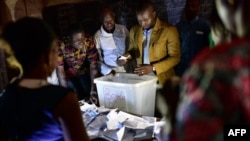Officials in Mali say more than 700 polling stations were not able to operate during Sunday's presidential election because of attacks or threats of violence.
Authorities said Monday the counting of ballots is underway, but said no ballots were cast at 716 polling stations — representing just over 3 percent of the country's total — because violence forced the stations to stay closed.
The affected polling stations are located in the country's central and northern regions, areas that have already been troubled by Islamic extremism and ethnic unrest.
Reports of violence included election officials beaten up, ballot boxes burned and election supervisors stopped by armed groups from entering polling stations.
Security was a central issue during the campaign in which President Ibrahim Boubacar Keita is seeking a second term against 24 challengers.
The government said the vote across much of the country was peaceful and was carried out in an orderly way. However, the disenfranchised voters could turn into a flashpoint for Mali if the result is close.
Keita's main challenger is Soumaila Cisse, a former finance and economy minister, who lost against the president in the 2013 election. Cisse has already complained about the vote being disrupted, as well as possible election fraud.
The international community is hoping for an overall successful presidential election in Mali. A positive outcome would help solidify a peace agreement between the government, pro-government forces and former Tuareg rebels in combating Islamic extremists in the largely lawless north.
Initial results of Sunday's vote are expected later this week, with a final result coming by Friday.
If no candidate wins more than 50 percent of the vote, a runoff is scheduled for Aug. 12.









